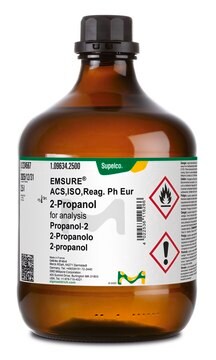320048
2-Methyl-1-propanol
ACS reagent, ≥99.0%
Synonyme(s) :
Isobutanol, Isobutyl alcohol
About This Item
Produits recommandés
Qualité
ACS reagent
Densité de vapeur
2.55 (vs air)
Pression de vapeur
8 mmHg ( 20 °C)
8.8 mmHg ( 0 °C)
Essai
≥99.0%
Forme
liquid
Température d'inflammation spontanée
801 °F
Limite d'explosivité
10.6 %
dilution
(for analytical testing)
Impuretés
≤0.0005 meq/g Titr. acid
≤0.01% butyraldehyde
≤0.02% 2-butanone
≤0.1% water
Résidus d'évap.
≤0.001%
Couleur
APHA: ≤10
Indice de réfraction
n20/D 1.396 (lit.)
pb
108 °C (lit.)
Pf
−108 °C (lit.)
Densité
0.803 g/mL at 25 °C (lit.)
Chaîne SMILES
CC(C)CO
InChI
1S/C4H10O/c1-4(2)3-5/h4-5H,3H2,1-2H3
Clé InChI
ZXEKIIBDNHEJCQ-UHFFFAOYSA-N
Vous recherchez des produits similaires ? Visite Guide de comparaison des produits
Catégories apparentées
Mention d'avertissement
Danger
Mentions de danger
Conseils de prudence
Classification des risques
Eye Dam. 1 - Flam. Liq. 3 - Skin Irrit. 2 - STOT SE 3
Organes cibles
Central nervous system, Respiratory system
Code de la classe de stockage
3 - Flammable liquids
Classe de danger pour l'eau (WGK)
WGK 1
Point d'éclair (°F)
82.4 °F - closed cup
Point d'éclair (°C)
28 °C - closed cup
Faites votre choix parmi les versions les plus récentes :
Déjà en possession de ce produit ?
Retrouvez la documentation relative aux produits que vous avez récemment achetés dans la Bibliothèque de documents.
Les clients ont également consulté
Notre équipe de scientifiques dispose d'une expérience dans tous les secteurs de la recherche, notamment en sciences de la vie, science des matériaux, synthèse chimique, chromatographie, analyse et dans de nombreux autres domaines..
Contacter notre Service technique












